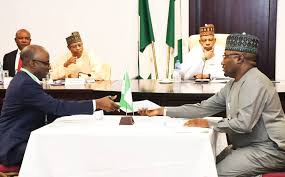The Government Enterprise and Empowerment Programme (GEEP) and the Presidential Committee on Economic and Financial Inclusion (PreCEFI) have agreed to explore strategic areas of collaboration aimed at accelerating economic growth, financial inclusion, and poverty reduction across Nigeria.
This development was disclosed in a statement issued on Tuesday by Attari M. Hope, Head of Communication and Public Relations at the National Social Investment Programme Agency (NSIPA).
During a high-level meeting with the Executive Secretary of PreCEFI, Nuruddeen Abubakar Zauro, GEEP’s National Programme Manager, Hamza Ibrahim Baba, highlighted the shared commitment of both institutions to citizen empowerment. He noted that their collective efforts align closely with the priorities outlined in President Bola Ahmed Tinubu’s Renewed Hope Agenda.
Baba provided an overview of GEEP’s focus under its current phase, GEEP 3.0, describing it as a government initiative that targets micro and small businesses—especially in the informal sector—with financial support and empowerment tools. According to him, the programme’s long-term goal is to drive sustainable development, stimulate grassroots entrepreneurship, and generate employment across underserved communities.
He emphasized that collaboration with PreCEFI would amplify their impact, stating that partnerships are essential in scaling programs that directly address poverty and economic exclusion.
In response, Zauro expressed strong enthusiasm for the partnership and outlined several areas where PreCEFI could complement GEEP’s efforts. These include digital identity initiatives, joint program development, co-hosting outreach events, and conducting collaborative fieldwork to deepen their reach and effectiveness. He assured that his technical team would begin working closely with GEEP to establish a structured framework for implementation.
The partnership between GEEP and PreCEFI represents a coordinated effort to align financial empowerment strategies with national economic inclusion objectives. It underscores the government’s intention to create sustainable pathways for millions of Nigerians especially those at the base of the economic pyramid—to access resources, build resilience, and contribute meaningfully to the country’s development.










